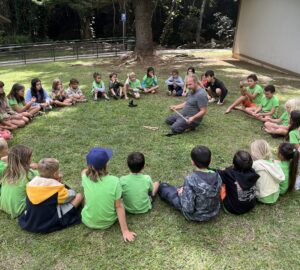When in discussion with other parents, the homeschooling parent is often asked, “Gosh, isn’t that a lot of work?” or “How do you know what you’re doing?”, or told, “I don’t have the patience!” or “Wow! That must consume so much of your time!”
These concerns are valid, yet homeschooling is often misunderstood. Though there are challenges to homeschooling, it can be a rewarding and beneficial experience.
Most parents had early experiences of learning which gave them the impression that learning was something difficult and unlikable they had to do. Their teachers needed to exert a certain amount of force, coercion, and pressure to get them to learn.
So, when homeschooling comes to mind, many people think they would have to use a substantial amount of energy persuading their child to cooperate in the learning process. Granted their emotional needs are met, a child has an innate desire to learn. He or she will naturally want to go beyond the level of survival to enrich their experience of life. He or she will want to acquire more knowledge and skills. This longing is intrinsic and can be maintained indefinitely.
While some children are “schooled” at home, many homeschooled children have the freedom to learn what they are interested in, and at their own pace. With this method, there is less pressure on the child, nurturing their inborn yearning to learn. This creates a child who learns with ease and with joy. A child who is ready and willing to learn to read will learn to read much faster and more easily than a child who has been encouraged to read before ready. This takes a lot of the strain off the parent of the homeschooled child. They are not expected to produce a competent reader by any particular time and can wait until their child is ready, making the task a great deal easier and more enjoyable. A reading child learns a great deal on their own from the content of the material they read. They will likely take this on eagerly if there has been no pressure put on the child around learning. The child will also be able to retain more effectively things he or she have taught themselves through reading, experimenting, or asking questions. The child learns to access a variety of resources and develops behaviors that support continued learning experiences.
Homeschooling can also be more time efficient than some realize. In a classroom setting, it takes a longer period of time to convey a smaller amount of information. A lot of homeschooling parents say their child is excelling by doing academics in less time per day than a conventionally schooled child spends in a classroom. Homeschooled children do, in most cases, excel. This fact is supported by research. An informative article in the July-August 2005 issue of Mothering magazine quoted a study by Dr. Brian Ray which found that homeschooled children score on average in the 76th percentile or higher in reading, language and math. This outranks 70 to 80 percent of their conventionally schooled peers at any grade level.
A lot of parents feel they are underqualified for the job, that it is above their ability level and that it would be too difficult to be responsible for their child’s education. The homeschooling parent, however, need only be available to their own children as they learn, as opposed to a teacher in a school setting who is responsible for up to thirty children. You do not have to be a certified teacher in order to assist your child in their learning process and you don’t have to be exceedingly academic yourself. Providing resources for your child, and answering questions constitutes a large amount of what homeschooling parents do.
If a parent does not know how to answer a question it is not difficult, in the age of information, to find the answer. This is something within anyone’s grasp, often for free. The local library or the internet are two of many resources that can answer any question a parent finds difficulty answering based on their own knowledge. As another example, you could think of the pre-school aged child. Up until that point the child has learned vast amounts of information almost completely on their own. Almost every child learns to talk with no assistance except that others talked around him or to him. This learning was mostly self-motivated. Homeschooling is just an extension of what began at birth, which has required little of the parent in the field of teaching credentials. The same study mentioned earlier found that homeschooled children whose parents were certified teachers did not score higher than home schooled children of parents who were not certified teachers.
With regard to time management, a homeschooling family has the option of committing as little or as much of their time to academics as suits their family. There is a large amount of flexibility as to how the day is structured. Academics can be done anytime and any way that works for the individual family. One family may do academics at eight o’clock at night, while another family may do their academic work first thing in the morning. Homeschooling families are free to spend their days in a manner that they find most effective towards meeting their needs. Since, as stated earlier, the type of learning done by most homeschoolers is more time efficient, there is much more time for activities like gardening, going to the beach, surfing, playing games or participating in sports, taking classes, etc.
Most communities also have homeschooling groups that meet regularly where families may share resources or learning experiences with each other. Learning, though, takes place everywhere in most homeschooling families. The beach becomes a discussion about marine life, or a hike in the woods a discussion about animal habitats. Planting seeds or building a birdhouse can inspire discussions about math. The possibilities are endless.
Many homeschooling parents feel happy to have their children with them and find being part of their child’s learning process a satisfying experience. The parents are average people with no more exceptional abilities than you would find among parents of conventionally schooled children.
As many families have found, there are successful ways to work through the challenges homeschooling presents, making it possible to experience the benefits and rewards that also come with it.
This article was written by Jolie Strickland, Homeschooling mother



